Year 6 Football Tournament
Last night, our year 6 footballers went to Wetherby High School to take part in a tournament against other local schools. It was the first opportunity that our girls team have had to play against other teams. Everybody played fantastically and it was great to see Scholes embrace mixed gender football teams. Whilst we didn’t win any trophies, there were lots of goals scored and loads of great teamwork. Harry worked hard throughout, to the point where he was exhausted and Lily saved some great shots in goal.
A fantastic effort by everyone! Thanks also to the parents who transported the children and stood in the drizzle for 2 hours – you are amazing too!

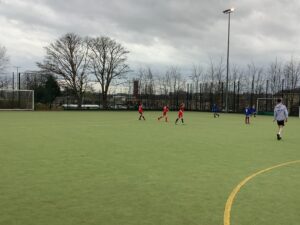
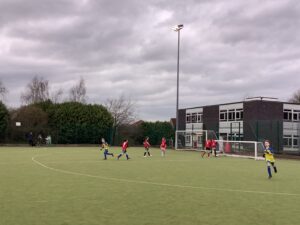
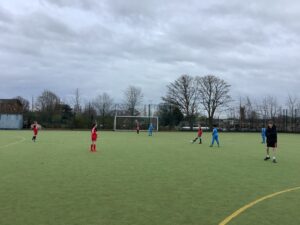
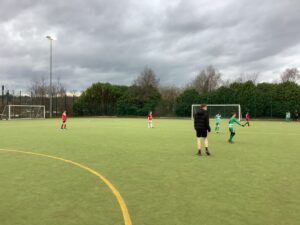
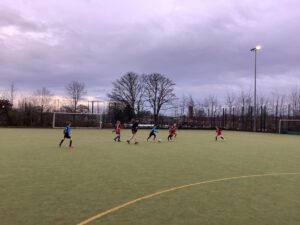
Topic: computing
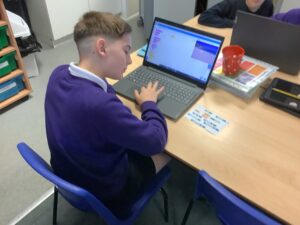
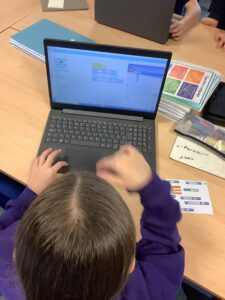
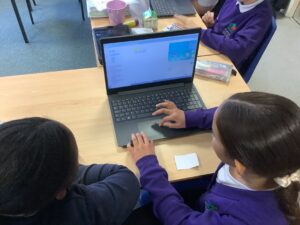
This week in topic we have been powering up the laptops again. Our current learning is all about computing and how to create programs. Using the Scratch platform we have been creating our own chat bot games. These are interactive games that allow a player to answer questions. This children needed to use selection to choose the correct blocks and build the algorithm for their game. The children also needed to select a background and a sprite (character). We will continue to work on our projects and we will debug any issues with our games.
Help at home: Can you help your child learn our computing vocabulary?

I Asked The River by Valerie Bloom
In this week’s reading skills lessons, we are reading the poem: I Asked the River by Valerie Bloom.
So far, we’ve enjoyed the poem and discussed:
– the rhyming sequence
– how it makes us feel
– the links it has to global issues
– any questions we have about it
– any vocabulary we’re curious about
– our likes and dislikes
– what connections we have to it (things we’ve previously read, seen or done)
Enjoy the poem below!
Help at home: Practise reading this poem with your child and make up some retrieval or interpret questions to check your child’s understanding. Some examples could be:
Who did the river have to meet?
When did the river have lunch with the sea?
Why does the river only foam and seethe from stanza eight?
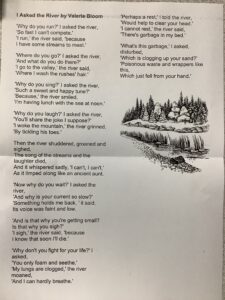
Writing
Year 5/6 have been writing their own tension building texts this week. We used a video called Francis as inspiration. We talked about the use of figurative language, short snappy sentences and repetition to help put the reader on the edge of their seat.
Help at home: Use your child’s favourite TV show or film as a stimulus. Can they write in the same style? What language has been used? How does this help create the world of the show?



PE – yoga
Tuesday saw 5,6B having a go at yoga. We began the session with some breathing exercises to some relaxing music. We then began to learn some yoga poses such as river and tree. These are based on stretching and balancing and were actually very tricky. We also did some poses that involved working with a partner and it was great to see the children working together. By the end of the session we were very relaxed and chilled!





Reading
We have linked our reading to writing this week and looked at the use of vocabulary. The children are noticing that authors make choices in their writing to help create a mood and effect on the reader. They have read lots of extracts over the last couple of lessons and identified the effect it has on them. Did it make them feel anxious? Elated? Petrified? They found evidence in the text to identify the deliberate word choices that the authors had used.



Viking Artefacts
Year 5/6 have been exploring some Viking Artefacts. They made predictions about what each item was used for. We then discussed how the items have changed over time. There were some items that we still use today which have not changed very much in 1000 years.






Reading: class novels
Year 5/6 have thoroughly enjoyed their class novels this year. From tales of escaping from harsh environments in David Long’s Survivors to the thrilling tale of Gunnar in Tony Bradman’s Viking Boy, children have been captivated by these fantastically rich texts.
In 56C, children are now enjoying reading a book which is structured in a different way; You are the chracter and you get to choose the path your story takes.
Help at home: discuss the class novel. Which one is your child’s favourite? Go to the library and ask for similar books to share at home.




PE – dodgeball
We have been having a great time over the last few weeks learning lots of new dodgeball games. As a class, we are very competent players at the original game, however the children needed to test their skills at some brand new games. Dodgeball is a fast paced game that requires quick movements, good defence and an accurate aim. The children played games of ‘poison ball’ which is a ‘last person standing’ game. They played large team games such as ‘benchball dodgeball’. This involves losing your team to a bench on the opposite side of the court if they are hit. It’s a game of attack and defence. These new games have definitely been great fun and we are all out of breath by the end of our PE sessions.







Leeds United Primary Choices
This half term, Year 6 had a workshop from the Leeds United Foundation about Choices. The workshop covered a range of subjects: antisocial behaviour, being aware of apps, moving on to high school, making friends and legal ages.
Two children were also lucky enough to win two tickets each to watch Leeds vs Leicester. What a fantastic prize!



